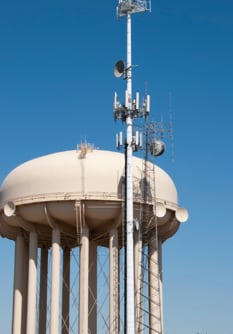Municipal Cell Tower Leases – Can They Be Sold?
Why Selling Municipal Tower Leases Can Be a Bad Idea!
It’s disappointing to see municipalities selling the lease income from their towers to third-party lease buyout companies. Often, municipalities try to auction these leases after being approached by a single lease buyout company, believing they’re acting in their citizens’ best interests. However, this decision often results in undervaluing their tower assets due to a lack of understanding of their options.
Selling a Tower Collocation Lease:
When a lease buyout company purchases a collocation lease on a municipal-owned tower, they acquire the rights to that lease area. If they buy all of the leases on the municipal tower, they typically include language that allows them to add other tenants to the tower and collect 50% of the revenue. Even in situations where they aren’t taking a revenue share from future tenants, the lease buyout companies take the first right to future tenants if an existing tenant on the tower leaves. These companies typically pay 16-18 years’ worth of rent to acquire the leases on the tower.
Versus Selling the Municipal Tower Outright
 In contrast, selling communication towers outright typically earns sellers 20-40 times the annual rent for the sale. However, if the municipality sells the leases to a buyout company, they still have to maintain and operate the tower, even without income. If the tower is damaged or destroyed, the municipality must pay for its replacement, despite not receiving any revenue from the sold leases. So, selling to a lease buyout company means losing income while still bearing the operational costs and retaining the obligation to operate the tower on a day-to-day basis: to insure it, to maintain it, to provide utilities, and to operate it.
In contrast, selling communication towers outright typically earns sellers 20-40 times the annual rent for the sale. However, if the municipality sells the leases to a buyout company, they still have to maintain and operate the tower, even without income. If the tower is damaged or destroyed, the municipality must pay for its replacement, despite not receiving any revenue from the sold leases. So, selling to a lease buyout company means losing income while still bearing the operational costs and retaining the obligation to operate the tower on a day-to-day basis: to insure it, to maintain it, to provide utilities, and to operate it.
If the municipality sells the tower itself, it no longer has to pay for or operate it. The tower company taking over would handle insurance, maintenance, utilities, and repairs. Though the municipality would lose future tenant income, it would be much better compensated upfront.
Keeping Rights to Operate Public Safety Equipment
One of the primary concerns that municipalities have about this type of arrangement is that they lose control over the structure where their public safety equipment is located. However, it is quite common and easy for a municipal tower owner to include language in the sale agreement for the tower that reserves their current and future rights to place public safety equipment on the tower.
Long Term Agreements and Controls
In either scenario, the municipality is binding itself to a long-term agreement. In the case of a lease buyout, the buyout company will take a long-term easement under the leases that can’t be terminated. In the case of the outright sale of the tower, the tower purchaser will either take a long-term easement or a long-term nominal value lease. In both scenarios, the municipality is losing control of its asset. The difference is in who bears the future operating expenses and risks.
Why Choose SteelTree Partners – How We Can Help
SteelTree Partners understands that selling a municipal tower is not right for all municipalities. However, in some cases, the municipality must generate capital without raising taxes. SteelTree Partners rarely sees situations where selling the leases separately from the tower is beneficial. If your municipality is contemplating the sale of municipal tower leases or a municipal cell tower, contact SteelTree Partners for a free consultation about the value of your communication tower. After collecting some data about your tower, SteelTree Partners will provide a free verbal estimate of the value of the structure. We will evaluate your tower and provide a free verbal estimate of its value and guidance on whether selling the tower asset or lease is appropriate. We also review how best to meet your goals.